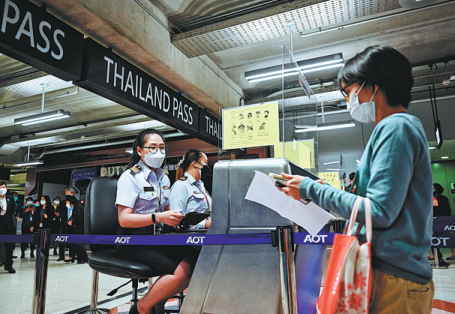Experts say countries should remain cautious about reopening borders


As more Asian countries look at reopening their borders and their economies with a "living with COVID" strategy, experts said governments should remain cautious and prepare plans in case of a rise in infections.
"As we think about opening-up, the most important thing to emphasize is that not only should there be a plan for relaxing restrictions, but there should at the same time be a plan for what to do in case restrictions are needed again," said Jerome Kim, director-general of the International Vaccine Institute, a nonprofit organization in Seoul.
For example, in the United Kingdom, after most pandemic restrictions were lifted in July, the country is now facing a surge in COVID-19 cases, and the government is considering whether to reinstate mask wearing and other guidelines.
"(Governments) should discuss what the plans are for reinstating requirements," said Kim, adding that if the hospitalization rate reaches 80 percent of intensive care unit capacity and overwhelms the health system, then measures will need to be taken either locally or nationally.
Across Asia, an increasing number of governments are gradually moving toward coexisting with COVID-19 and reopening their borders for economic recovery.
In South Korea, a government-led committee is expected to announce on Friday its final road map for the country to gradually return to normal life under a "living with COVID-19" plan from Monday, according to Yonhap News Agency.
According to its road map released last Monday, the government will relax most of its COVID-19 restrictions and introduce the "vaccine pass" system in a phased manner. Mandatory mask wearing will remain in place until the final phase.
South Korea's plan came as over 70 percent of its 52 million population were fully vaccinated. As of Wednesday, about 79.6 percent of its entire population had received at least one dose, with 71.5 percent being fully vaccinated, according to the Korea Disease Control and Prevention Agency. Among the adult population, 83.1 percent of people aged above 18 have received their second vaccination.
Malaysia is eyeing a trial border reopening for international tourists next month while Singapore, one of the first countries to declare that it will be "living with COVID-19", is allowing quarantine-free entry from a number of countries and regions, including China. Singapore has fully vaccinated 84 percent of its people and is expected to launch a vaccinated tourist lane with South Korea in mid-November.
On Wednesday, Singapore reported 5,324 new COVID-19 cases, its highest number since the beginning of the pandemic, and added 10 new deaths.
The Singaporean Ministry of Health said it is investigating the spike, adding: "The infection numbers are unusually high today, mostly due to many COVID-positive cases detected by the testing laboratories within a few hours in the afternoon."
Thailand will reopen to vaccinated foreign visitors from 46 countries from Monday, while Vietnam plans to reopen the resort island of Phu Quoc in late November.
Thira Woratanarat, an associate professor at the Department of Preventive and Social Medicine at Chulalongkorn University in Bangkok, said Asian countries have also learned from the experience of Chile and Denmark, which opened recently after achieving vaccination rates of over 70 percent and saw their number of daily new infections double in the past three weeks.
Thira said Thailand is in a riskier position than other countries, given that the Southeast Asian nation is reporting high daily infection numbers, and has a limited screening capacity.
"The most worrisome issue is that only 39.9 percent of the population has been fully vaccinated," said Thira, adding that the government needs to enhance its COVID-19 screening capacity and strengthen precautions.
As a pilot reopening program, Thailand launched the Phuket Sandbox in July. Thira said most infections were among local residents and the increase in tourism-related activities after reopening will be a strong catalyst for greater transmission in the community with its current low vaccination level.
In Indonesia, the resort island of Bali reopened on Oct 14 for fully vaccinated travelers from 19 countries. But they have to test negative and undergo a five-day quarantine in a hotel. As of Wednesday, the vaccination rate in Indonesia was just over 33 percent, according to official data.
Noting that Malaysia had vaccinated 94.4 percent of its adult population as of Monday, molecular virus expert Vinod Balasubramaniam from Monash University Malaysia, said he agrees with reopening its borders while stringent procedures can be put in place to mitigate the risk of importing new infections as it remains cautious about new variants and potential risks.
"Malaysia is on the right track in living with COVID-19," said Balasubramaniam, noting the expectation that COVID-19 will become endemic, essentially meaning that the pandemic will not end with the virus disappearing but that enough people will gain immunity.
Nikolaus Osterrieder, dean of the Jockey Club College of Veterinary Medicine and Life Sciences at the City University of Hong Kong, said that reopening borders needs "a mixed approach". Vaccinated travelers can come in but they need to still be tested and undergo a short quarantine period. Vaccinations will also reduce the risk, but health officials also need to keep in mind the number of vulnerable people-like the elderly or those who have underlying health conditions-when deciding to reopen their borders.
Though ample evidence has shown that vaccines will not completely prevent infections, Kim, from the International Vaccine Institute in Seoul, said the real impact of vaccination is that it can help protect people from severe illness, hospitalization and death.
Kim said it is important to recognize that there will be hospitalizations among vaccinated people and even fatalities. He said the question is how governments and society see and react to such situations.
Noting that different countries have different attitudes toward reopening and the strategy of coexisting with COVID-19, Kim said there is no universal standard for such plans.
"Every country will need to adapt the local policies to whatever standard (they have)," said Kim. "Every country is different for both political and societal reasons."
































